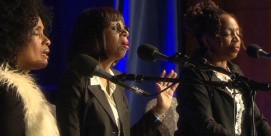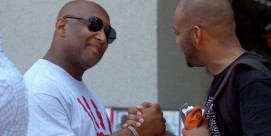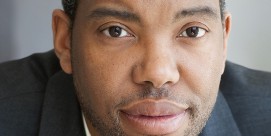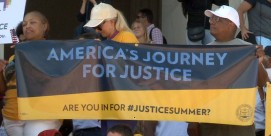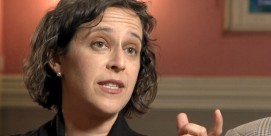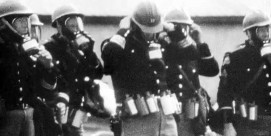GLENN ESKEW (Professor of History, Georgia State University): The Civil Rights Act of 1964 had addressed equal access as consumers. It had mentioned voting rights but it didn't really address how to solve the problem of discrimination at the polls and so the Civil Rights Movement moved beyond 1963 to focusing on voting rights in 1964 and '65.
Voting rights have been a driving force of the Civil Rights Movement from the beginning and across the South there had been efforts to register, and in some parts of the Deep South especially—resistance was quite strong by a white minority determined to hang onto power. And so in states like Mississippi and Alabama, you had restrictions on voting that had been put into place by controlling the electorate with all kinds of means, and that was the problem in much of Alabama. Many African Americans were denied franchise through restrictions, outrageous questions that would be asked when they went to register to vote and never being able to become part of the electorate—they were shut out of voting.
Dr. King would call voting getting first-class citizenship, and the idea within the African American community was to be able to participate in the political system, to actually be a citizen and to have those rights of citizenship that had been denied since the refusal to enforce the 14th and 15th amendments to the U.S. Constitution in the aftermath of Reconstruction.
Churches were integral to the whole Civil Rights struggle—"movement centers," Alden Morris would call them, a sociologist who studied the movement. And these movement centers were really in the churches because the churches were controlled by the African American community. You had black pastors, you had black congregations, and they were, for the large part, outside of any kind of white control, and as a result of that, some churches and their ministers became leaders in the Civil Rights struggle. Not all, mind you. There were many churches that were hesitant to join the Civil Right Movement, and for good reason, because participation in this nonviolent struggle could lead to vigilante attacks, dynamiting, bombings, burnings.
The Civil Rights Movement was able to play on the legacy of the post-World War II era. You had in America a realization of the evils of racism, because of Nazi Germany and the outrages of the Japanese empire in Asia, and consequently, many Americans will approach the Civil Rights Movement and come to understand that movement as their moral concern for their generation.
Bloody Sunday, which was the attack of Jim Clark and his deputies, and a state power of George Wallace and the state of Alabama, at the foot of the Edmund Pettus Bridge on March 7, 1965, that violence against these nonviolent activists who were simply marching to demand the right to vote and have been stopped by that sea of blue of those officers. It outraged America. It really captivated, in a nutshell, the protest of the day, of the moment, and I think it did so for a variety of reasons.
On the one hand, you've got the simple message of what appears to be good versus evil. You have these demonstrators who are calling for the access to the vote, for the franchise, and are willing to put their lives on the line and confront that violence. At the same time, it is caught on film and then is broadcast with special news bulletins that appear on the nightly television. Most significantly, the ABC Sunday Night Movie that evening was "Judgement at Nuremburg," and this film about the Nazi atrocities is interrupted to show footage of this atrocity in Alabama, and that really galvanized people across America who see the clip and then respond when the Reverend Dr. Martin Luther King, Jr. calls for them to come to Selma the next day to join in what he calls "the minister's march" which will occur on March 9th, asking for religious leaders to come. And King's call will encourage hundreds to drive in Selma to continue the protest.
In many ways, it's the answer to Dr. King's letter from Birmingham Jail which he had written in 1963 during his incarceration in Birmingham. King had—and indeed his supporters, the lieutenants of his in the Civil Rights Movement—had been looking for an opportunity to lay a charge against white moderates in the white church, white religious leaders, for failing to support civil rights. He saw them as disinterested, really, not willing to side with what he saw as the great moral issue of the day, ending racial discrimination. And so in King's letter from Birmingham Jail, he calls out and says, "You know, that's the greatest disappointment, is that church leaders aren't supporting us, whereas they should and indeed Sunday is the most segregated day of the week, with separate church services. Why aren't you supporting the movement?"
And he was answering a letter that had been written by white religious leaders in Alabama who had criticized the movement in Birmingham as being unwise and untimely, that it should wait, and King eloquently responds in his letter from Birmingham Jail, the most eloquent statement I think on nonviolence that comes out of the Civil Rights Movement. He says, "We hear 'wait' all the time. It's never a good time to respond." And he casts his response like a Pauline letter, an epistle. And as if like St. Paul answering that Macedonian who's calling out for help, he says, "We must come. We must offer our help." It's an apostolic charge to come into areas. "Injustice anywhere is injustice everywhere."
The Church had been waking up to the need for race reform in the post-war era. You had, following Brown in 1954, the mainstream Protestant denominations taking on the issue of race and making decisions like the Methodist Church saying that racism was unacceptable anymore and moving towards desegregating the Church and its jurisdictions, the Episcopal Church saying that racism was a sin and immoral. But the change had been slow among the establishment within the churches from the top down, but from the seminarians, the young people, from the bottom up, they embraced the movement, they embraced the idea of racial change and many of them will be coming into Selma. And so in the aftermath of Bloody Sunday you find a lot of young ministers arriving in Selma to volunteer but also to try to stay and to work for change, people like the Unitarian minister James Reeb, you get the Episcopal seminarian Jonathan Daniels, two men who will later be killed in Selma.
The Selma to Montgomery march resulted in reforms to guarantee that citizens had the right to vote, but unfortunately I think in many ways we see efforts to try to abridge those rights, to curtail those rights, and citizens are having to struggle to maintain those rights to vote and to be able to have their voice heard in our democracy.

